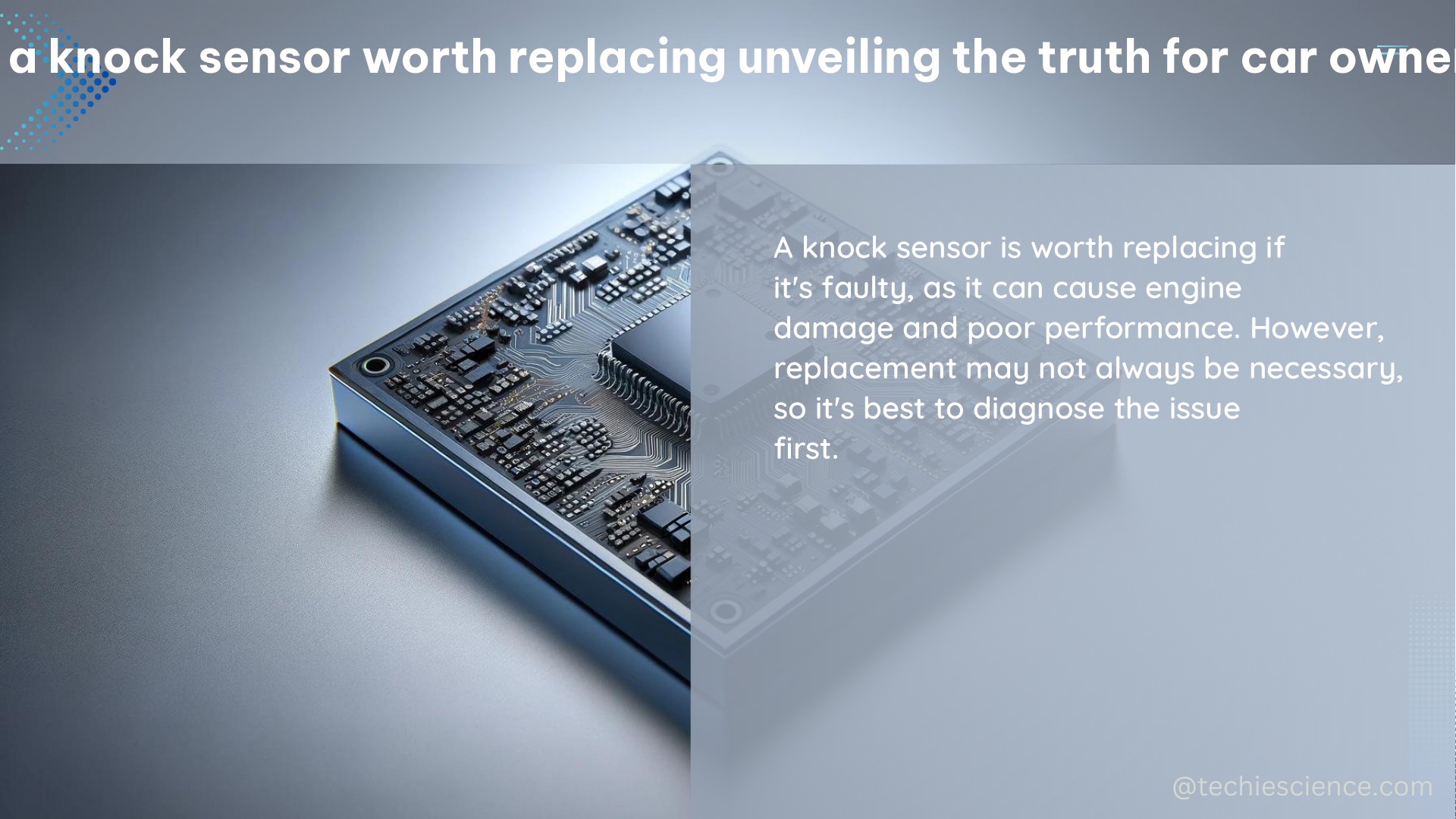A knock sensor is a crucial component in modern engines, responsible for monitoring combustion and adjusting ignition timing to prevent engine damage. Understanding the role of a knock sensor and the consequences of a faulty one is essential for car owners to make an informed decision on whether replacing it is worth the investment.
The Importance of Knock Sensors
Knock sensors are designed to detect abnormal vibrations or “knocks” in the engine, which can be caused by improper fuel-air mixture ignition. When the sensor detects these vibrations, it sends a signal to the engine control unit (ECU), which then adjusts the ignition timing and fuel mixture to prevent further engine damage.
Without a functioning knock sensor, the ECU may not receive the necessary information to make these adjustments, leading to several issues:
- Engine Knocking: Undetected engine knocking can cause severe damage to the engine, including cracked pistons, cylinder walls, and other internal components.
- Reduced Performance: Engine knocking can result in a noticeable decrease in engine performance, such as reduced power, acceleration, and fuel efficiency.
- Increased Fuel Consumption: The ECU’s inability to adjust the fuel-air mixture can lead to increased fuel consumption, as the engine may be running in a less efficient state.
Factors Affecting Knock Sensor Failure

While low fluid levels can indirectly contribute to knock sensor failure, they are not the primary cause. Knock sensors typically fail due to a variety of factors, including:
- Age and Wear: Over time, the knock sensor can wear down and become less sensitive to engine vibrations, leading to failure.
- Direct Damage: Physical damage to the knock sensor, such as from a collision or improper installation, can also cause it to malfunction.
- Electrical Issues: Problems with the wiring or connectors associated with the knock sensor can disrupt its signal to the ECU.
- Extreme Temperatures: Exposure to extremely high or low temperatures can degrade the sensor’s internal components and lead to failure.
Maintaining Proper Fluid Levels
While low fluid levels do not directly cause knock sensor failure, they can indirectly contribute to it. Fluids like motor oil, transmission fluid, and coolant play a crucial role in maintaining the engine’s temperature and reducing wear on its components. If these fluids are low, the engine may run hotter than usual, leading to increased wear on the engine and, potentially, the knock sensor.
To prevent this, it’s essential to regularly check and maintain proper fluid levels in your vehicle. This includes:
- Motor Oil: Check the oil level and change it according to the manufacturer’s recommended schedule.
- Transmission Fluid: Inspect the transmission fluid level and change it as per the manufacturer’s recommendations.
- Coolant: Ensure the coolant level is within the specified range and that the cooling system is functioning correctly.
Replacing the Knock Sensor
If your vehicle’s knock sensor is malfunctioning, it’s generally worth replacing it, especially if it’s causing engine issues. The cost of a replacement knock sensor can vary depending on the make and model of your vehicle, but it’s typically a relatively inexpensive repair compared to the potential damage that can occur if the sensor is left unchecked.
When replacing the knock sensor, it’s essential to follow the manufacturer’s instructions carefully and ensure that the new sensor is compatible with your vehicle. Improper installation can lead to further issues, so it’s recommended to have the replacement performed by a qualified mechanic if you’re not comfortable doing it yourself.
Conclusion
In summary, a functioning knock sensor is crucial for maintaining the health and performance of your engine. While low fluid levels can indirectly contribute to sensor failure, they are not the primary cause. Regular maintenance, including checking fluid levels and replacing the knock sensor as needed, is essential for ensuring your vehicle’s optimal performance and longevity.
By understanding the importance of the knock sensor and the factors that can lead to its failure, car owners can make an informed decision on whether replacing it is worth the investment. By taking proactive steps to maintain their vehicle’s engine, they can avoid costly repairs and enjoy a smoother, more efficient driving experience.
References:
- Knock Sensor Data Question | Hyundai Genesis Forum: https://www.gencoupe.com/threads/knock-sensor-data-question.285002/
- How about a Knock Sensor – BMW 2002 FAQ: https://www.bmw2002faq.com/forums/topic/299279-how-about-a-knock-sensor/
- Can low fluid levels cause a knock sensor to become faulty?: https://mechanics.stackexchange.com/questions/71265/can-low-fluid-levels-cause-a-knock-sensor-to-become-faulty
- Knock Sensors Market Size with Key Industry Development …: https://www.linkedin.com/pulse/knock-sensors-market-size-key-industry-development-4cgwc?trk=article-ssr-frontend-pulse_more-articles_related-content-card
- SVTPerformance: Knock sensor reading question from my data logs: https://www.svtperformance.com/threads/knock-sensor-reading-question-from-my-data-logs.1028076/

The lambdageeks.com Core SME Team is a group of experienced subject matter experts from diverse scientific and technical fields including Physics, Chemistry, Technology,Electronics & Electrical Engineering, Automotive, Mechanical Engineering. Our team collaborates to create high-quality, well-researched articles on a wide range of science and technology topics for the lambdageeks.com website.
All Our Senior SME are having more than 7 Years of experience in the respective fields . They are either Working Industry Professionals or assocaited With different Universities. Refer Our Authors Page to get to know About our Core SMEs.